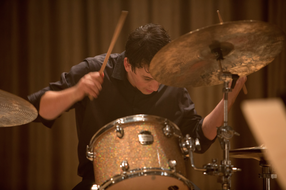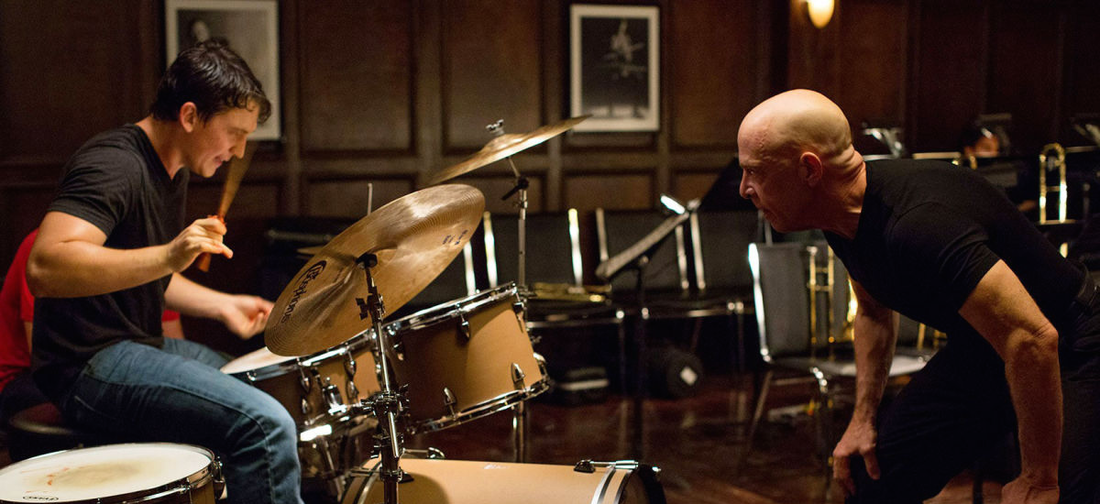| Good jazz is about hard choices. An amateur soloist will play three times the notes she needs, stumbling where she should be silent, searching helplessly for the perfect lick. Meanwhile, the jazz legends are coy and calculating—masters of restraint. Where beginners trot, Charlie Parker tip-toes. Where novices plink and plunk, Herbie Hancock plays a single, soulful chord. It’s why a bad high school concert can seem like nothing more than noise, while a classic jazz album sounds precise to the point of perfection. |  TheCroakingFrog says See It Now What Hopped: Intense focus, fierce momentum, jazz as a tactile art form What Croaked: minor pacing problems near the end Recommendation Key: See It Now: see ASAP See It: see if you have time Skip It: see at your own risk Forget It: avoid at all costs |

Whiplash is the best sort of jazz. Directed by then-29-year-old Damien Chazelle, the film is uncompromisingly focused, absurdly precise, and honest to its core. Chazelle could have made the movie twice as long, but crucially, he knows leaving out two or three good notes is far better than letting in a single bad one.
At the outset, we meet Andrew (Miles Teller), an 18-year-old drummer at America’s most prestigious jazz institution, Shaffer Conservatory of Music (read: Juilliard). He’s got a bit of charm, a sense of entitlement, and a quiet streak of self-absorption—in other words, he’s an American college student. He soon meets Fletcher (J.K. Simmons, who won an Oscar for the role), the irascible band director as brilliant as he is violent-tempered. The two form a quick bond, with one helping of mutual respect and three or four helpings of swearwords, disappointments and physical abuse.
Here, Chazelle makes his first hard choice. Though jazz is communal by its very nature—with drums, bass, piano, saxophones, trumpets and trombones all playing in concert--Whiplash focuses defiantly on this single relationship. Andrew’s bandmates aren’t fellow musicians, but rather pawns, to be manipulated and positioned strategically by pupil and teacher. The whole set up is a bit unrealistic—Fletcher spends 90 percent of each class session berating Andrew and ignoring his other students. But what the scenes lack in conventional realism, they make up in psychological purity. Fletcher and Andrew are obsessed—with each other, with jazz, with excellence by any means necessary. The film’s intense focus mirrors their obsession.
Chazelle’s second choice is to prize the visual, tactile elements of jazz above even the music itself. We see the clicks and clacks of sax valves, the crunch of Andrew’s high-hat, the sizzle of the ride cymbal, the crisp flick of music sheets across a dozen metal-frame stands. When Andrew really gets cooking, we see beads of sweat splashing in glorious high definition on the snare drum below. To hear jazz is to enjoy jazz, but to watch a drummer’s knuckle whiten with intensity, or to see the fuzzy waves around a vibrating cymbal, is to be consumed by the full jazz experience.
Though Chazelle may be meticulous in his set up, characters and visual expression, he elects to leave the film’s final third untidy, asking questions rather than steering the plot toward a trim resolution. Andrew has the talent to be the next great jazz drummer; Fletcher, the ragged determination to see that Andrew gets there. But at what cost? And how far is too far? “There are no two words in the English language more harmful than ‘good job,’" Fletcher says. “Charlie Parker had a cymbal thrown at his head. [Without that,] no Bird.” Fletcher’s teaching methods are plainly problematic, often abusive...and yet Chazelle won’t let us dismiss his philosophies entirely. It’s a risky choice for a final act. It’s also the right choice.
And then, like any good double-time swing, the film ends as abruptly as it began. It’s tempting to focus on the minor imperfections—a meandering last chapter; an unorthodox final scene; the exaggerated portrayal of an elite music university—but all of these quibbles misunderstand what the film is ultimately about. The best jazz doesn’t attempt to be correct, but rather, to be crafty, to play tricks, to take risks. With Whiplash, Chazelle nails his solo.


 RSS Feed
RSS Feed
